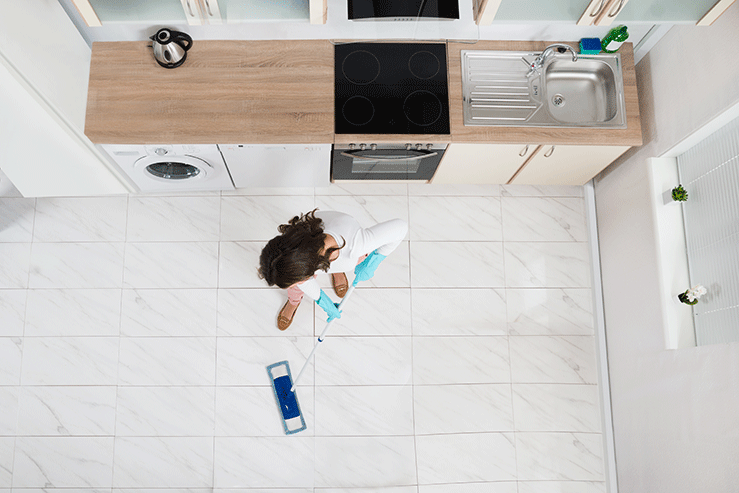
New year. New home. Well not quite, but there are lots of simple changes you can make to make it feel like it’s brand new. They don’t even have to be big changes! From cleaning the carpet to installing shelves in the garage, this list of 8 easy to achieve New Year’s resolutions will have your home feeling fresh and revitalised so you can relax and enjoy 2016 to the fullest.
1. Create a Bushfire Emergency Survival Kit
Be smart and create a Bush Fire Emergency Survival Kit. The Australian summer is notorious for its bad bush fires, and if you are in an area of moderate to high risk then an emergency survival kit is a must-have in your home.
The kit means you’ll have easy access to resources and tools that can help you survive a bush fire or other natural disaster, such as flood. It should include things that will assist you no matter the circumstance from leaving to staying to actively defending your home.
To do so simply:
- Find a waterproof storage container, hard case suitcase, or waterproof bag. This is going to be the foundation of your kit.
- Establish a location in your home that you can easily get to in a hurry. This is where you are going to put your kit.
- Make sure that everyone in your family knows where this kit is and is familiar with what they need to add in the event of a natural disaster.
So what kind of things should you put in the kit? The NSW Rural Fire Service says that you should always include basic items like:
- A first aid kit (with first aid manual),
- Emergency contact numbers,
- Portable battery-operated radio,
- Woollen blankets,
- Spare batteries,
- Waterproof bags for valuables, and
- Waterproof torch.
If you are planning on leaving your home in an emergency, additional items that you will need to add in the kit before you go include:
- Important documents such as passports and birth certificates, valuables and photos (put in waterproof bags),
- Medications, toiletries and sanitary products,
- Cash and ATM/credit cards,
- Mobile phone and phone charger,
- Laptop or tablet device,
- Change of clothes for everyone, and
- Drinking water – guidelines recommend a minimum three litres per person, per day.
IMPORTANT: Remember to include any special supplies for infants, the elderly, injured, disabled or chronically ill.
Don’t forget about your pets! Make sure you have food, a leash, basket or carrier, medication, and their favourite toy. Also remember to make sure they are wearing an identification tag so if you are separated someone will be able to contact you.
2. Go sustainable
2016 could be the year that you minimise your carbon footprint and shrink your electricity and water bills at the same time.
- Lighting
Currently, traditional lights like incandescent bulbs are being phased out in Australia because they are inefficient. So change the lights inside and outside your home to energy efficient LED (Light Emitting Diode) globes. These globes use 75% less energy than a traditional incandescent bulb and have an expected lifetime of 20,000 to 40,000 hours, making them four to five times more efficient than traditional lighting.
Solar lighting in your garden is also a great way to cut down on your energy bills and save the planet.
- Insulation
Stay cooler this summer and warmer next winter by installing new insulation. Insulation will cut down on your reliance on fans, air-conditioners, and heaters, and subsequently will reduce your energy and gas bills as well as the amount of greenhouse gas emissions you are contributing to. Don’t let leaking air and draughts increase your heating bill! Or let hot air creep into your home and force you to run the air-conditioner all the time.
- Paint
Could the paint in your home be causing you and your family to develop short-term and long-term health problems? Many solvent-based paints for your home contain harmful chemicals called volative organic compounds (VOCs). Over time these chemicals degrade and emit gases that contribute to the ozone layer. They can also cause fatigue, headaches, dizziness, nausea, irritation of the throat and eyes, and damage to organs.
So this New Year think about minimising your risk by repainting your home’s interior and exterior using a low-VOC or no-VOC paint in a fresh and modern colour scheme.
- Appliances
Check your appliances’ energy efficiency labelling and see which could have a better star rating. In Australia it is mandatory for all refrigerators, washing machines, dryers, and other electrical appliances to be rated under the energy efficiency labelling scheme. The more stars an appliance has, the better is for the environment and your bank balance.
- Water
Change standard taps and showerheads in your home to more water-efficient alternatives.
Prevent 18 litres of water a minute being wasted, by replacing your showerhead!
To find the right water-efficient product for your bathroom it’s recommended that you use the Water Efficiency Labelling and Standards Scheme (WELS) website, where you’ll be able to investigate and compare the water efficiency star-rating of various showerheads and taps in Australia.
Aerators are a great water efficient tap fixture that uses a combination of water and air to create a strong flow that uses much less water than a standard tap. You can even buy aerators that screw or attack to the tap nozzle, making for a quick and easy installation.
And if you have large paved or concrete areas that you frequently clean, consider investing in a high pressure cleaner. They will effectively clean any outdoor space, without using as much water as the house.
For more information on turning your bathroom green, check out this article on our blog.
3. Donate all that clutter
Maybe you’re beginning to worry you’ve become a bit of a hoarder, or maybe you just haven’t had a chance to sort through everything you’ve accumulated over the years. If you feel like you should cut down the amount of material things you own, than you probably should. However, you don’t always have to throw it out.
Think about donating anything you don’t need, from clothing to tableware to a not-for-profit.
For example, Dress for Success Australia accepts donations of women’s business suits and professional apparel. They then use these donations to help women dress for job interviews.
They accept clothing such as:
- Interview appropriate style blouses, suits, skirts, dresses, blazers, and jackets,
- Interview appropriate footwear,
- New and unopened make-up,
- New and unopened toiletries,
- Handbags, and
- Jewellery.
The requirements for donating are:
- Clothing must be no more than 5 years old,
- Clothing is freshly laundered or dry-cleaned and ironed (if required).
For more information on how to donate visit this website: https://sydney.dressforsuccess.org/get-involved/donation-drives/.
4. Make it kid friendly
Make your home more inclusive by giving it kid friendly touches that will encourage your kids to be more self-reliant and responsible. It will also make your home feel more welcoming and fun to guests of all ages.
Kid friendly ideas include:
- Installing low shelves in the bedroom for toys, books and knick knacks so your child can learn to put things away and be tidy,
- Getting a trunk for the end of the bed. Charming and chic, a trunk is a handy place to keep toys, books, shoes, sporting equipment, blankets, and school bags. Depending on the shape and size they can also double as a seat!
- Installing child-height hooks for clothes,
- Freshening up your walls with some framed art by the kids, or
- Adding a chalkboard to the living room so the kids can draw and write whilst they watch television (and exercise those little minds!)
5. Garage or storage unit?
Stop using the garage as a storage unit (and a very unorganised one at that). Tidy and organise this space to get the most out of it. Be it completely cleaning everything out so you can finally put the car in or replacing cardboard storage boxes with plastic containers, getting your garage in order will make your home feel instantly more modern.
- Remove everything from the garage, this is includes tools, bikes, and boxes. Think about donating anything you don’t want. If it’s not in good condition and doesn’t hold sentimental value, throw it out.
- Organise what’s left into piles (e.g. Christmas decorations, old baby clothes, etc) instead of having boxes of random bits and pieces
- Research wall mounted storage solutions such as shelves or cabinets to help free up space on the ground
- Use plastic storage solutions instead of cardboard boxes. Cardboard not only slowly degrades over time it is a very attractive home for pests like rats and mice
- Organise tools on a pegboard or in a toolbox
- Bikes take up a lot of space, so get a bike storage rack to open up even more floor space
- A vertical hanging organiser is a fantastic for shovels, brooms, rakes, and ladders
- Install an automatic garage door system. You can buy a do-it-yourself model for relatively cheap or you can pay more to get it installed by a technician.
6. Get your pool or spa accredited
The NSW Government, Department of Fair Trading has announced that, “From 29 April 2016 all properties in NSW with a swimming pool or spa pool cannot be sold or leased without a valid certificate of compliance or relevant occupation certificate”.
To obtain a certificate of compliance contact your local council or a private certifier.
You should also have a CPR (cardiopulmonary resuscitation) chart that:
- Is in good condition, and
- Can be read from at least 3 metres away.
Purchase a CPR chart from a pool shop, The Royal Lifesaving Society, St John Ambulance, Australian Red Cross, or Clark Rubber.
7. Clean out your gutters
It’s easy to neglect gutters, but in the New Year it is a very good idea to finally get around to cleaning them out.
Here’s why:
- A gutter full of leaves and debris is an extreme fire hazard,
- A blocked gutter full of stagnant water is a breeding ground for mosquitoes and subsequently increasing your chances of contracting diseases such as Ross River Virus,
- Pests love blocked gutters, and
- Water damage to your home can be costly to fix and decrease the value of your home.
8. Freshen your carpet
Restore your carpet to its former glory. After 365 days of feet, shoes, and general wear and tear, your carpet is probably in need of some desperate TLC. A clean carpet can do wonders, from brightening a space to making the flooring feel soft and brand new.
Carpet cleaning is also an easy DIY job if you want to save money. There are many cleaning products available at the local supermarket or hardware. All you need is a good vacuum to force out all that dirt and grime from the carpet fibres.

 02 9624 7099
02 9624 7099





